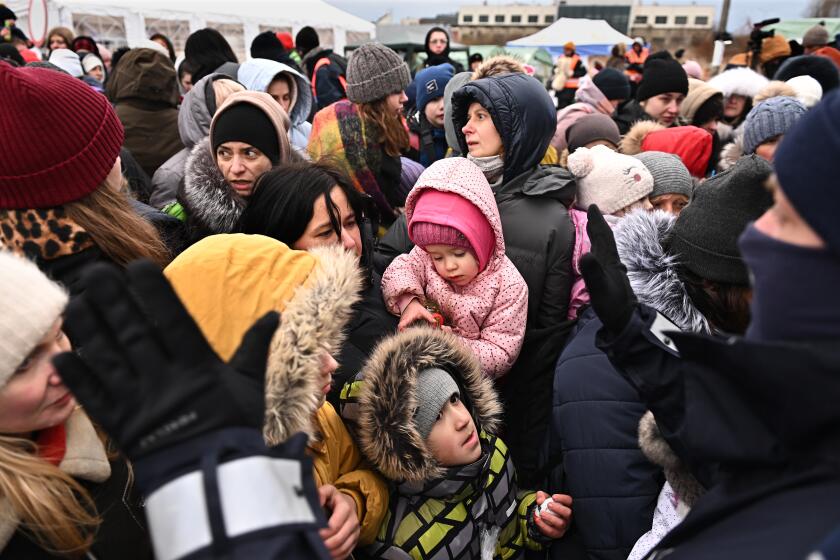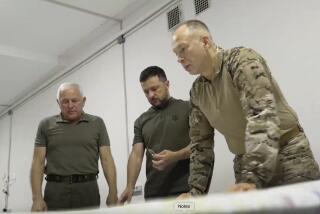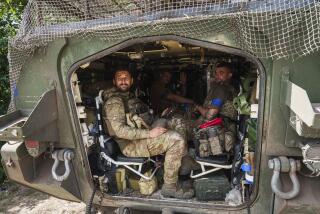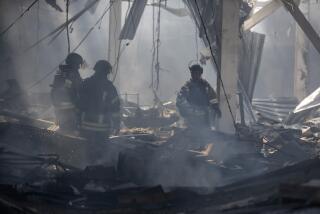Battle moves westward as Russia strikes Ukrainian base near Poland, killing at least 35
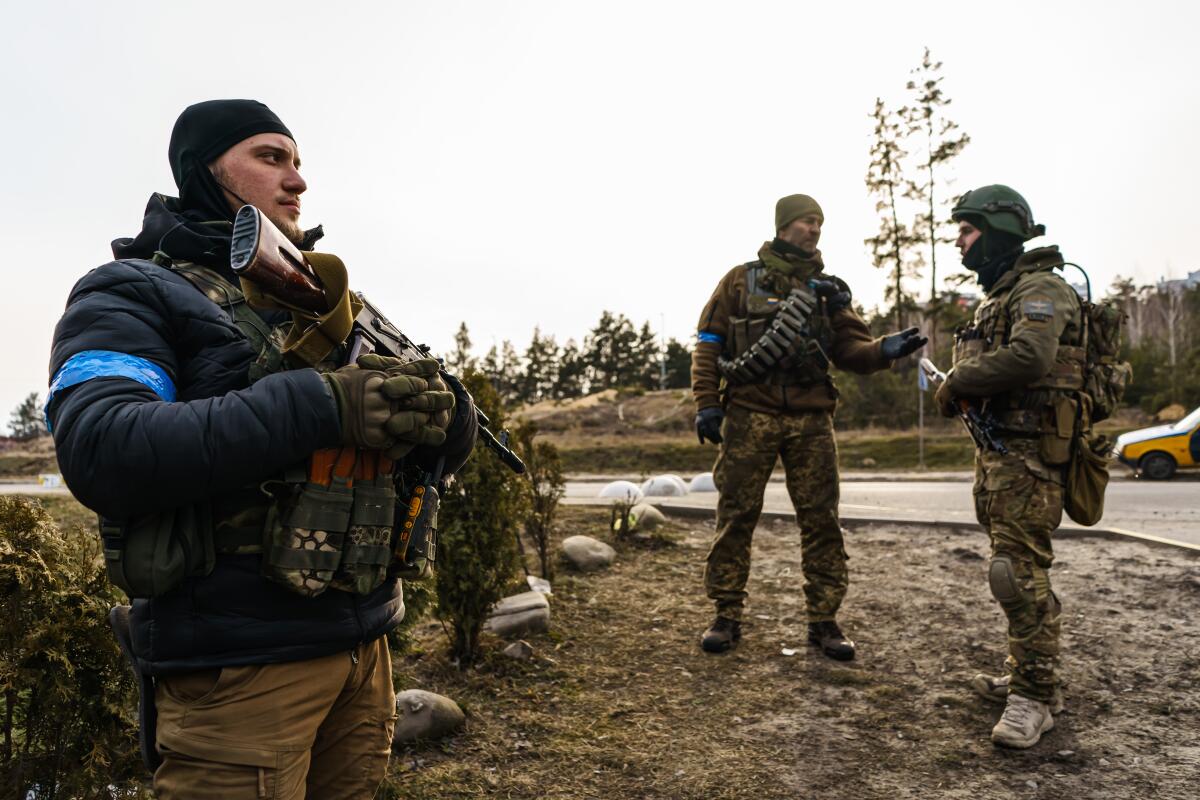
- Share via
LVIV, Ukraine — Bringing the war closer to NATO territory, Russian fighter jets fired dozens of missiles Sunday at a Ukrainian military training base near the border with Poland, killing at least 35 people, injuring 134 others and rattling nerves in western Ukraine’s largest city.
With Russia’s unprovoked war against its Slavic neighbor midway through a third wrenching week, the Biden administration signaled Sunday that it would challenge any effort by Moscow to enlist Chinese help in evading the effects of Western sanctions that are pummeling Russia’s economy. High-level U.S.-Chinese talks were set Monday in Rome.
Amid the intensifying conflict, Ukrainian authorities on Sunday reported the death of an award-winning American journalist and documentary filmmaker, Brent Renaud, in Irpin, a suburb of Kyiv that has been the scene of intensive Russian bombardment. Another journalist who was with him was wounded, they said.
Anton Gerashchenko, an advisor to Ukraine’s interior minister, said Renaud “paid with his life” for documenting the suffering caused by the invasion.
In the Sunday morning attack near the Polish border, Ukraine said its air defenses downed most of the incoming missiles aimed at the base in the town of Yavoriv, known as the International Peacekeeping and Security Center. But at least eight hit the facility, igniting fires that raged for hours and setting off an intense search-and-rescue effort, said Maksym Kozytskyi, head of the Lviv regional administration, who confirmed the death toll.
Russia offered its own version of the strike, with its Defense Ministry claiming a far higher death toll — 180 — and saying the attack was aimed at foreign weaponry and “foreign mercenaries.” The two sides’ conflicting casualty claims could not be immediately reconciled.
The targeted base, some 11 miles from the Polish border, was used before the war for the training of Ukrainian troops by NATO forces, and is now a logistical hub and training center for arriving foreign volunteers.
No American troops were present at the center when it was hit, although U.S. forces regularly rotated through before the war, and were at the site as recently as “several weeks” ago, Pentagon spokesman John Kirby said on ABC’s “This Week.”
The training center’s proximity to the frontier raises the specter that Russia may seek to block a crucial artery for both humanitarian supplies and shipments of weaponry. Russia said Saturday that it would consider Western weapons shipments to Ukraine a “legitimate target,” though without suggesting it would strike outside Ukraine’s borders.
As the base was under attack, air raid sirens wailed Sunday in the major metropolis of Lviv, about 25 miles to the southeast, which has become a refuge and a transit point for those seeking to escape spiraling bombardment in the country’s north, south and east. A booming voice on loudspeakers urged: “Citizens! Seek shelter!”
Lviv residents were told to turn on radios for news updates, and switch off gas and electrical connections to prevent fires. Some people hurried back to their homes or to other shelter when the sirens sounded, though many continued taking their morning coffee in the open air, or walking about on the cobblestoned streets of the city center.
“People are definitely getting more stressed,” said Alex Liashch, 35, an IT worker interviewed in central Rynok Square. “The war is coming here too.”
On the war’s 18th day, the strike on the training base came against the backdrop of a devastating Russian assault on Ukrainian cities and towns, which has brought invading forces closer to the outskirts of the capital, Kyiv, and caused a dire humanitarian crisis in the besieged southern port of Mariupol. Authorities in Mariupol have been burying bodies in mass graves, and residents reported boiling water from puddles to drink.
The civilian toll continued to climb — but even those trying to track noncombatant fatalities acknowledge their estimates are surely low. On Sunday, the United Nations High Commissioner for Human Rights said at least 596 civilians have been killed since the start of the Russian onslaught, 43 of them children. At least 1,067 have been injured, it said.
Russian attacks on healthcare facilities are being singled out for particular condemnation. Three U.N. agencies issued a joint statement calling attacks on health infrastructure, patients and personnel “horrific” and “an act of unconscionable cruelty.”
Getting food and medical supplies to Mariupol — where local officials say more than 2,100 people have been killed, an estimate that could not be independently verified — is a crucial mission, Ukrainian President Volodymyr Zelensky said Sunday. A humanitarian shipment remained more than 20 miles from the city, blocked for several days by bombardment, after trying repeatedly to reach Mariupol from the north.
“Today the key task is Mariupol,” Zelensky said in a video address.
With a Russian armored column only about 15 miles from Kyiv, the city’s mayor, Vitali Klitschko, said a full-scale assault could come at any time. But Ukrainian officials say the Russians’ failure to breach the city more than two weeks after invading on Feb. 24 points to disorganization and poor planning on Russia’s part — and their own fierce determination to defend the capital.
“It’s not secret that the goal, the target, is Kyiv,” Klitschko told CNN’s “State of the Union” on Sunday, adding that Ukrainian defenders “destroyed the plans of Russians.”
U.S. officials also sounded the theme that Russia’s invasion has not gone as planned. National security advisor Jake Sullivan, interviewed on CNN, said Russian President Vladimir Putin was “frustrated by the fact that his forces are not making the kind of progress that he thought they would make against major cities, including Kyiv.”
As a result, he said, the Russian leader is “lashing out” at an expanded list of targets.
In the southern city of Mykolaiv, nine civilians were killed in a Russian airstrike Sunday, the regional governor, Vitaliy Kim, said in a video address. The Black Sea port has been under attack as Russia aims to seize Ukraine’s seacoasts to block vital maritime access.
The fighting has spurred an enormous refugee exodus, with more than 2.6 million people, mainly women and children, fleeing to neighboring countries. More than 1.5 million have arrived in Poland, which has appealed for more international help in caring for them.
Anxiety grows in Poland, where many fear Russia is on a dangerous expansionist path. History shows the Poles have every reason to be afraid.
Although there has been little visible sign of diplomatic progress — French President Emmanuel Macron and German Chancellor Olaf Scholz both spoke Saturday with Putin and reported no breakthroughs — a top U.S. diplomat said there might be some movement in the offing.
Deputy Secretary of State Wendy R. Sherman said on “Fox News Sunday” that Russian diplomats were beginning to show willingness to enter into “real, serious” negotiations aimed at halting the fighting.
China has refrained from publicly criticizing Putin; the Biden administration appeared to be seeking ways to soften Beijing’s pro-Moscow stance. Sullivan, the national security advisor, is to meet Monday in Rome with Yang Jiechi, China’s top foreign policy official, the White House said Sunday, with Ukraine among the topics to be discussed.
Previewing that encounter, Sullivan said in his CNN interview that Beijing has already been told “directly, privately” that the United States would not “allow there to be a lifeline” to Russia from any country to help it evade sanctions.
The Kremlin has demanded that Ukraine renounce future attempts to join NATO, demilitarize and acknowledge Russian sovereignty over the Crimean peninsula, which Russia seized in 2014. Ukraine has resisted on all counts, and demanded an immediate halt to fighting.
On the ground, signs pointed to a widening zone of conflict, spreading westward. In Ivano-Frankivsk, in the country’s west, Mayor Ruslan Martsinkiv said in a Facebook post Sunday that Russian missiles had targeted the city airport for a third time. Last week, Russian forces struck Lutsk airfield,
roughly 70 miles from the Polish border.
Sunday’s strike on the military training base prompted warnings from Ukrainian officials about the potential for the conflict spilling over into the territory of the North Atlantic Treaty Organization. Kozytskyi, head of the Lviv regional administration, wrote on a Telegram channel that bombardment “is approaching the borders of NATO countries.”
Lviv Mayor Andriy Sadovyi directly addressed President Biden and the NATO chief in warning of prospects for a spillover. “Joe Biden, Jens Stoltenberg, do you understand that war is closer than you imagine?” he wrote on Facebook. “Russia is already on your border.”
NATO forces are not involved in fighting inside Ukraine, and the Biden administration is resolutely avoiding steps that could spark direct confrontation with Russian forces, such as a no-fly zone that Zelensky has repeatedly pleaded be created.
Ukraine also telegraphed disappointment that a proposed deal under which Poland would have transferred Russian-made fighter jets to NATO, for passing on to Ukraine, was nixed by the U.S. because it was seen as a potential spark for direct conflict between Russia and NATO. Ukrainian Foreign Minister Dmytro Kuleba, interviewed on CBS, on Sunday urged the United States and allies to supply “all the weapons necessary.”
“We need more planes. This is the most pressing issue,” he said. “We are ready to fight, but we need proper equipment to do so.”
In an ominous sign of how Russia intends to deal with areas that fall under its control, Russia appointed an “acting” mayor in the southern city of Melitopol to replace the city’s defiantly anti-occupation mayor, Ivan Fedorov, who was arrested and taken away last week after helping to organize protests against the invasion.
The Russian appointee, Galina Danilchenko, issued a video statement Sunday telling residents of the city that they needed to adjust to “the new reality” of Russian occupation.
Sunday brought a new peace appeal from Pope Francis, who has called for an immediate halt to the Russian invasion.
“In the name of God, let the cry of the suffering people be heard, and let the bombings and attacks stop,” the pontiff said, addressing crowds assembled in St. Peter’s Square. “In the name of God, I ask you, stop this massacre.”
McDonnell reported from Lviv, Bulos from Kyiv and King from Washington. Times staff writer Anumita Kaur contributed to this report from Washington.
More to Read
Sign up for Essential California
The most important California stories and recommendations in your inbox every morning.
You may occasionally receive promotional content from the Los Angeles Times.
